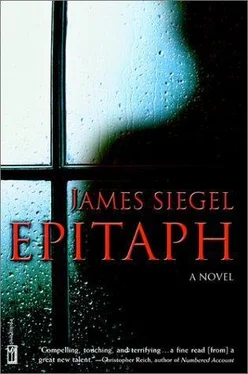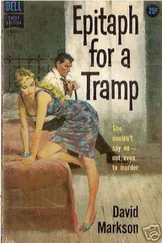James Siegel - Epitaph
Здесь есть возможность читать онлайн «James Siegel - Epitaph» весь текст электронной книги совершенно бесплатно (целиком полную версию без сокращений). В некоторых случаях можно слушать аудио, скачать через торрент в формате fb2 и присутствует краткое содержание. Жанр: Триллер, на английском языке. Описание произведения, (предисловие) а так же отзывы посетителей доступны на портале библиотеки ЛибКат.
- Название:Epitaph
- Автор:
- Жанр:
- Год:неизвестен
- ISBN:нет данных
- Рейтинг книги:4 / 5. Голосов: 1
-
Избранное:Добавить в избранное
- Отзывы:
-
Ваша оценка:
- 80
- 1
- 2
- 3
- 4
- 5
Epitaph: краткое содержание, описание и аннотация
Предлагаем к чтению аннотацию, описание, краткое содержание или предисловие (зависит от того, что написал сам автор книги «Epitaph»). Если вы не нашли необходимую информацию о книге — напишите в комментариях, мы постараемся отыскать её.
Epitaph — читать онлайн бесплатно полную книгу (весь текст) целиком
Ниже представлен текст книги, разбитый по страницам. Система сохранения места последней прочитанной страницы, позволяет с удобством читать онлайн бесплатно книгу «Epitaph», без необходимости каждый раз заново искать на чём Вы остановились. Поставьте закладку, и сможете в любой момент перейти на страницу, на которой закончили чтение.
Интервал:
Закладка:
But Dr. Morten hadn't gotten up and left him. Dr. Morten hadn't refused him as a patient. Jean was a case. Cases are like that. You don't have to like them. You just have to finish them. Dr. Morten and himself had both seen a Jean that wasn't. Fair enough, life is full of nasty surprises. But cases have a life of their own. Jean had known that. So had Santini. But that's what William had almost forgotten, had nearly just misplaced somewhere beneath the shock and revulsion. The case. The case was neither Jean nor him. It just was. You find what you look for, Jean had said. So be sure you look for the right thing. And now, at last, he was. Not for self-respect, or second youth, or even justice. Just for a solution. And if he had to do it for someone-for inspiration if nothing else, and he could no longer do it for Jean-he could do it for them. Arthur Shankin, Doris Winters, Alma Ross. Because he knew where they were now. He came in, Mr. Weeks told him, looking like a ghost. Just like a ghost. But Mr. Weeks, out of touch as he was with daily human lingo, had, of course, gotten the expression wrong.
TWENTY-FIVE
They were finally going to do something about the local lot-the Garden of Weeden as Mrs. Simpson so aptly called it. She'd gone and organized a committee, not, to be sure, a very large one, but with just enough pluck, and more importantly, enough hands, to get things done. That something needed to be done was obvious to one and all-even to Mr. Jeffries, who used it as a literal dumping ground for his household waste, not to mention his dog, Bumper's. Just fertilizing, he'd say.
And perhaps he was right. For the weeds had reached Olympian proportions this year, snaking out over the sidewalk and even pushing up through the cracks, so that the neighboring block was beginning to resemble nothing so much as a Mayan ruin-that is, civilization gone to seed. The houses that bordered the lot-including, of course, hers-seemed to be only awaiting their turn-just more fodder for the predatory jungle. Mrs. Simpson was determined to fight back. They had three large cutters-they being the committee-plus one rather ominous-looking machete that Mr. Jeffries claimed to have wrestled off a Japanese soldier in the Philippines. Work would begin soon-she had pledges from both Mrs. Tyler and her husband, though she had a sneaking suspicion it would turn out to be mostly her out there, hacking away like a geriatric Jungle Jim.
Her husband, of course, was indifferent to it all. He'd taken to sleeping a lot lately, that is, sleeping even more than usual, and she lacked the heart to pester him. Though sometimes, in her more anxious moments, she wondered if this was the way it was going to be-him sleeping more and more till one day he just wouldn't wake up. The doctor had told her not to expect miracles-after all, to be up and about after two massive strokes was, in a way, miraculous enough. But she couldn't help hoping for a return to the way things used to be-if only for a while, if only for a moment or two at the end of a summer day.
In the meantime, she had her gardening-and she had her lot, her mission improbable.
And sometimes, when she was bent over a particularly stubborn shoot of crabgrass, or poised like a fountain with the sprinkler in her hand, she had him. Her little watcher. Her memories of him.
For she had never been able to completely remove him from her thoughts-perhaps had not really wanted to. In a way, they were linked together-the lot and him, though the fact that he'd stood in its shadow was the least of it. Maybe it was that both of them were projects, her projects, and just as the lot both frightened and frustrated her-so had he. There was something uncivilized about both of them-something stalkish. And now that she was about to root one of them out of her life, she couldn't help thinking of the other.
And the truth is, she felt just a little guilty. As if she was about to destroy the nest of last season's bird-who might, or might not, return. She was betting the house on might not, but reality, after all, didn't have much to do with it. It was more a psychic murder she was committing here, a cutting of ties, and she wasn't at all sure she wanted this particular tie cut.
She had, of course, fled from him, right back into her garden mitts, to her shears, weed cutters, and root grouters, back to more harmless pursuits. But after a while, after he'd refused to show up again, she'd begun to realize just how close harmlessness is to death. And she'd recalled what that woman had said to her frightened child the day they'd stumbled onto a convalescing Mr. Simpson in the front yard, just weeks after his stroke and still mostly drool and grimace. He's harmless, the woman had said. That's all. And she'd been right of course.
Life had turned sort of harmless for both of them- and she, for one, didn't like it. Most people her age wanted to be left alone, but she wasn't most people. She was-as her grandson might have put it-a bit harm- lessed out.
Which made it all the more remarkable that on a certain Monday morning, two days before the committee was due to begin its dire work, nine and one half weeks After Noticing Him-another one showed up.
TWENTY-SIX
To begin then, begin at the beginning. Begin with a French Hungarian named Jean Goldblum, who peddled people for profit. Who sought out men and women who were innocent of everything but poverty and sent them to the good doctor like sheep to the slaughter. Begin there. Then go on to the family-the smiling boy, the apple- cheeked girl, clinging to their mother like baby 'roos. The family portrait, the kind that's passed around over beer and sausages. Turn it into an archive. Every case for Jean was the same case and the case was his own. Picture Jean in a camp called Mauthausen, where he watched the bodies pile up like firewood while he only waited his turn. Death row Mauthausen was, and Jean the condemned man. But something went wrong; Jean was liberated. And when the well-meaning refugee committees gawked at his record, they proclaimed him heroic and quickly dispatched him to the land of opportunity. Where thanks to the beneficence of Mr. Klein and certain of his own innate gifts, he became a detective. The first eye of the Three Eyes Detective Agency, the detective who could spot guilt at fifty paces, then put a price tag on it.
You find yourself in a terrible situation. A situation where you have to do everything imaginable. Understand?
Yes, Jean. Now we understand.
Thirty years later, Jean was pinching children off the streets and selling them back to their parents. Same old Jean.
But then, something happened.
He came in, Weeks said, looking like a ghost. Just like a ghost.
And he said, I've got a case. A real case. The biggest case of my life.
What case is it? the woman asked him.
But Jean whispered, I can't tell you. But it's the biggest case…
I know, she said. Of your life.
Every case was the same case, and the case was his own.
And after Jean began to investigate this case, after he'd gone down to Florida and found what he was looking for, he'd come back and paid a visit to a clinic.
What sort of clinic?
A bad sort, Weeks said. That's what sort. They did some job on him.
And when Weeks asked him why he did it, why he'd went and had his numbers burnt off, Jean said: Because I've earned it. Every case was the same case, and the case was his own. And soon after that, Jean died. And William, old friend, old dupe, saw his obituary in the newspaper and went to pay his last respects. Which led him to Rodriguez, which led him to a phone book, which led him to the woman, which led him to Weeks, which led him, at last, to the case. Twelve old people who'd taken the banana boat to Florida and never reached the shore. Strange case. But a little, just a little, like another one. The perfect crime, Dr. Morten said. Because no one asked what happened to them-these Jews. The neighbors because they didn't care, the families because they did. Just another old person, Rodriguez said. Another old person with nobody. Family, yeah, Raoul said. But not to speak of. Twelve old people with nobody. With, that is, almost nobody. For the somebodies had gotten postcards. Dear Greely-The weather's lovely and I'm doing fine. Letters, Dr. Morten said, ostensibly from Argentina, just to let them know that everything was fine. Twelve old people. Like most old people these days. The herd, Mr. Brickman described them. Refugees, William had thought on the plane, running from the crime, the cold, the loneliness. Are there Nazis there, Mr. Gushenow asked. Are there Nazis in Argentina? No…just coconuts. Like in Florida. Where there are coconuts too. Twelve old people who'd taken a wrong turn. A lot like that other case, maybe more than a little like it. In fact, you could almost say that they were one and the same. Every case was the same case, and the case was his own. Twelve old people. Twelve refugees. Why did she go there? William had asked Raoul, the janitor. I think her doctor recommended it, he'd said. The doctor thought it'd be the best thing for her, Mrs. Goldblatt said, talking about another of the twelve. And when Weeks had asked Jean to seek medical help? I've already been to a doctor, Jean answered. And laughed. Begin at the beginning. Begin there, and if you can't swallow it, spit it out. But if you can swallow it, you have to swallow all of it. Even the last part. How did he die? he'd asked Rodriguez. Heart attack, Rodriguez said. The doctor came. But too late. The doctor came. But no one had called the doctor. Weeks hadn't. Neither had Rodriguez. But the doctor came. Every case was the same case, and the case was his own. His own. He came in looking like a ghost, Weeks had said. But Weeks had gotten the expression wrong, he had. People don't look like ghosts. People look like they've seen one. So Dr. Morten had been wrong too. They never found Marcel, he said.
Читать дальшеИнтервал:
Закладка:
Похожие книги на «Epitaph»
Представляем Вашему вниманию похожие книги на «Epitaph» списком для выбора. Мы отобрали схожую по названию и смыслу литературу в надежде предоставить читателям больше вариантов отыскать новые, интересные, ещё непрочитанные произведения.
Обсуждение, отзывы о книге «Epitaph» и просто собственные мнения читателей. Оставьте ваши комментарии, напишите, что Вы думаете о произведении, его смысле или главных героях. Укажите что конкретно понравилось, а что нет, и почему Вы так считаете.












